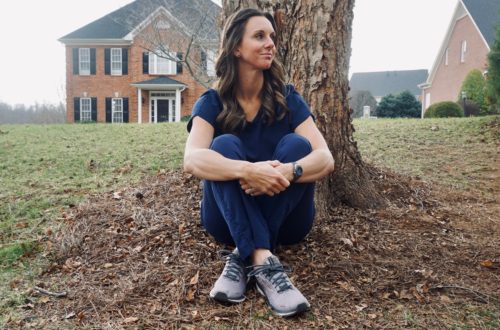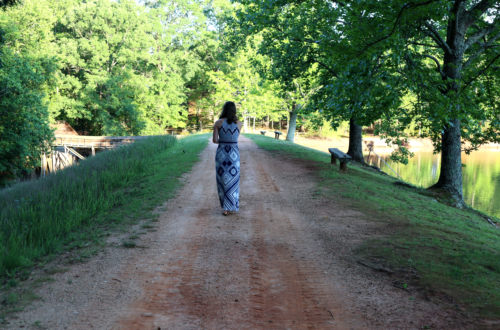
Let’s Be More Than Brunch Friends: Practical Advice from Proverbs

Experts have said there’s a global epidemic of loneliness. Between a pandemic and social media over the last two years, people are more lonely and anxious than ever. Deep and meaningful friendship seems to be a lost art.
The Book of Proverbs gives so much practical knowledge and has a lot to say about how to do friendship. Most of which will push up against the cultural norms and patterns of friendship today. I’m going to go into detail on a few that I think will be helpful. Not only that, they’ll probably challenge you a bit (or a lot), too!
If you haven’t read Part 1 of this friendship series, make sure you check that out here first.
First, let’s talk about why having deep, genuine, and meaningful friendships matter.
God Made Us For Friendship
How do I know that? Well, first look at Adam and Eve. In Genesis 2, God says that it isn’t good for man to be alone. Was He just talking about marriage? If you look at the rest of the Bible, I’d say marriage is one example, but it’s not the only thing He was talking about.
For example, God gave us the church that operates as a messy and imperfect family. He didn’t have to do that you know. We could have been sent out solo into the world to share the hope and love of Jesus. But if you’ve ever tried to do anything on your own, you know that at some point you max out how far you can go. There’s an African proverb that said if you want to go fast, go alone; if you want to go far, go together. In my experience, that’s true. Friendship can and should be a catalyst for good “fruit” in our lives.
Jesus Did Friendship First
Then there’s Jesus. Did He spend His time on Earth secluded, appearing randomly to do miracles and teach some lessons about God, only to disappear by Himself until He was ready to do it all over again? While Jesus did go off by himself for silence and to pray (the practice of silence and solitude is monumentally important for connecting with God), He was deeply involved in the lives of other people. He probably knew that would make His life more complicated, but He did it anyway.
Jesus had his 12 closest friends who He did life with, taught scripture to, showed them how to pray, and how to live out the vision God had for a human life. But He also was constantly going where the people were. Homes, temples, fields, fishing docks, farms, wells, you name it. Jesus intentionally put himself in the middle of people. Oftentimes, ones who were hurting, broken, hopeless, and lost in the world. Jesus gave the disciples lessons on friendship by showing them firsthand what it meant to be a good friend.
People will always let you down. You will always let other people down. God is the only one who demonstrates His perfect vision for friendship to us. He is slow to anger, abounding in love, and faithful to us when we are unfaithful to Him.
Loneliness and Brunch Friends
More and more I talk to people who are searching for friendship. The deep kind, where you’re free to be yourself and people love you anyway. The kind of friendships where people take ownership of you and you take ownership of them.
Unfortunately, we’ve substituted a lot of our time and energy into virtual relationships via social media that just don’t seem to give us what we need. Or, we fail to take a risk to enter into friendships that include vulnerability and revealing who we really are. We need people who will get in the middle of our messes with us, who can come alongside us as we struggle, and point us towards Jesus. Surprisingly, (or not so surprisingly) people tend to stick to the highlight reel of their life online and end up fighting the deepest battles of their life alone. Friend, I’m here to tell you that you don’t need to. There’s a better way.
We need more than “brunch friends” where conversations never scratch the surface of our deepest dreams and struggles. Don’t get me wrong, I do love a good brunch date, but do you see what I’m saying? Too often our friendships are built on shared interests and hobbies, and that’s about it. Most people don’t know the most difficult challenges their friends are facing or the greatest victories they’ve had this week. We present the version of ourselves that we think people will like, instead of what’s true. Conversations are kept at a respectable level of openness and they dare never move from casual to meaningful. If things get tough, instead of working through issues that arise we move on and start new relationships.
I’m not saying that building these types of friendships are easy, and I definitely haven’t arrived when it comes to this topic. In fact, I think I’m learning more every day by the grace of God. But what I’m saying is, I think it’s worth it.
If you look at what the Bible says about relationships (see Part 1 of this friendship series) and the practical advice we’re going to look at today, God has a vision for our friendships and community that goes far beyond small talk and brunch. Let’s look at what the Bible has to say about God’s vision for friendship in Proverbs.
We Don’t Need Yes Men (Or Women)
“Better is open rebuke than hidden love. Faithful are the wounds of a friend; profuse are the kisses of an enemy.”
Proverbs 27:5-6
I heard Lecrae, a Christian rapper, use the term “yes men” when he talked about having a crisis of faith several years ago. He talked about the danger of being surrounded by people who only support you and never question your actions or motives. This seemed to prolong his struggle with substance abuse and difficulties within his family. He said you need people who will ask you the hard questions and perform an intervention if needed.
Beware of the people who always tell you what you want to hear. Yes men will affirm you right into destroying your life if you’re not careful. We need people who know our unhealthy tendencies and lovingly direct us towards the way of Jesus. Something deepens in a friendship when this happens. Relationships are strengthened when we hold each other accountable and support each other.
If you’re honest, you don’t want friends who only tell you what you want to hear. You want friends who tell you the truth, right? In a way that shows they love and care about you. That was God’s intent when He gave us other people to do life with. We should help each other grow, throw off any sin we’re holding onto, and run hard after Jesus together.
At The End of the Day, It’s On You to Make Good Choices in Friendship
You’ve got a role in this, too. First, you can choose who you let in. Don’t only surround yourselves with “yes men” and don’t only share part of the story so no one can actually get close enough to give you an accurate opinion. Second, you have to be open to push back on the thoughts and decisions you make. We all have blind spots and we need people who love us enough to point them out. Feedback that may be hard to accept initially from a friend is better than a path of loss forged by our own decisions.
We Need Friendship to Grow
“Iron sharpens iron, and one man sharpens another.”
Proverbs 27:17
I just read an alternative interpretation of this verse here, but I’m going to go with the most widely accepted interpretation for now. You can read the alternative interpretation here.
In order for us to grow, we need other people who challenge us. It may be a little tenuous, having people bump up against you, sparks flying and all, in order to sharpen you. We won’t grow without getting a little uncomfortable. It reminds me of my roommate from college. She said her CrossFit coach used to say, “Get comfortable with being uncomfortable.” If you want to grow and mature in any aspect of your life, take that phrase to heart.
Friendship Maximizes Our Personal Growth
There is a limit to how much we can grow spiritually, physically, emotionally when we are by ourselves. Doing life with other people in close proximity and in-depth relationships is a catalyst for growth and maturity. This is why having a roommate, a spouse, or children in your daily life and close personal space can be so tough. These people are bumping up against our preferences and comfort and we do not like it! But, guess what? Considering others, being around people who are different than you and having other people point out our flaws are the things that help us become more like Jesus. Close friendship makes your reconsider your thoughts, opinions, patterns of behavior, and either changes you for the better or strengthens your own convictions.
Quality is Better Than Quantity
“A man of many companions may come to ruin, but there is a friend who sticks closer than a brother.”
Proverbs 18:24
There’s a temptation for us to focus on having a large group of acquaintances who really have no idea who we are or what’s going on in our life. For one thing, it feels easier and secondly it feels good to have a lot of friends. Proverbs has a caution for us when we focus too much on quantity and not enough on quality when it comes to friendship.
I love looking at Jesus’ life for this example. He had 3 friends in his inner circle (Peter, James, and John) who got to experience the most with him. Then, Jesus had 9 other friends in the second ring of his social circle, the rest of the disciples. They did ministry and life together, but only Peter, James, and John got to be present for some of Jesus’ hidden life.
Beware of the Crowd
Then, there’s the crowd. These are the hundreds and thousands of people outside of even the larger 70+ disciples that Luke talks about in his gospel. The crowd is unreliable and finicky. They celebrate Jesus one day and are the same people who kill him the next. Yikes. There’s a major lesson in there for us. We cannot be swayed by the opinions of the crowd.
Who is the crowd in your life? It’s likely anyone outside of your 12-15 closest friends. Which means, it’s most of the people you know. Be careful and make sure that you’re not trying to please the crowd above everyone else. They’re not going to be the ones to warn you when you’re making poor choices, but they’ll definitely be the ones pointing out your failure when you fall.
Why are their actions inconsistent and their feedback inaccurate? They don’t know you, that’s why. They’re not invested, they don’t know your story, they’re not in the ups and downs of life with you. It’s easier to be flaky when you were never really all in to begin with.
Real life example: Be careful how much stock you put on how people respond to you on social media. Especially if it’s part of your job or calling. Don’t get caught up in it, friend. Social media is a weapon, for good or for bad. Don’t base your choices on the affirmations and approval of the crowd.
Flaky Friends, Anger Issues, and Being Influenced
I’m going to go a little quicker through these last few since we talked about some of these themes in Part 1 of our blog series on Friendship.
Stick With Each Other
Chapter 17 says that true friends stick around when things get tough. Why do most people bail when things get messy? Odds are their motives for the friendship were all about getting and not about a mutually beneficial relationship. Tim Keller was talking about marriage when he said that most of us want to give as little as possible and get as much as possible, but I think the same applies for friendship. We want someone who is reliable, checks in on us, shows up when things are hard, but we ourselves aren’t willing to make the time and sacrifice to do those things for other people. Something about being human means that we have to train ourselves to be sacrificial because it doesn’t come naturally.
Look At Your Five Closest Friends
Proverbs again says that we become who are friends are (Proverbs 13:20). If you want to be wise, spend time with wise people. If you spend time with people who make poor decisions, you’ll likely make poor decisions. You get the picture. I think we know this to be true, but it’s a whole other deal to take a hard look at your relationships and decide some need to re-evaluated. Proverbs 12:26 says that we need to choose our friends carefully. That requires honesty and thoughtfulness about who you are spending your time with.
Warnings About Anger
Avoid placing people with an anger problem in your inner circle of friends. The Bible warns about anger many times outside of the Book of Proverbs. This is just another reminder that you become who your friends are and that when you have an anger problem, it will only lead to trouble.
Now to be fair, before you ditch your friend right now with anger issues, maybe try to talk to them about it and see if you can help them become a person of peace and contentment. See if they’re willing to change. Show them how God has the power to transform people. Most angry people are hurting people. Try seeing if you can help them through it.
This reminds me of a patient I had last year. He was so incredibly angry and quick to declare his hate for people. Like, not just one person, all people. “I just hate being around people,” he said. “That’s why I live out in the country by myself.” So I asked him a question. “What made you feel that way?”
He began to pour out his past hurts and pain to me. How he was bullied through school because he was biracial and his experiences turned him against wanting to build relationships with anyone at all. All I could do was pray for him and pray that God would redeem his view of people somehow. He isn’t the only angry person I’ve met that has a wound that’s never healed.
Or maybe that’s you and your anger is getting you into trouble with your relationships. Ask yourself where it’s coming from. Is there a hurt that hasn’t been dealt with? I’ve heard a counselor say that anger is a secondary emotion and that there is always something at the root of it.
When You’ve Been Hurt
This is a good time to talk about those of you who have been burned by people. You have legitimate hurt in your past, both unintentional and intentional. You’re afraid to get close to people again because fear of being hurt is all you can think about. You don’t want to go through that again.
Let’s start with this: People are absolutely going to hurt you and let you down, whether they try to or not. (I’m not talking about physical abuse, manipulation, or verbal abuse. I’m talking about our normal human tendencies and failures). Because we are not God and He is the only one who will love us perfectly. When we are secure in the identity God has given us, we can take relational hits. When we put the burden on other people for our happiness and identity, it crushes us when people fail us.
If you feel like you can never get close to anyone again, remind yourself that God is in the business of doing the impossible. He can take all of that hurt you’ve experienced and use it for something good. Only by His power can we take a leap of faith to trust again when we’ve been hurt in the past. He is in the business of making things new. Don’t underestimate what He can do!
In Summary
I’m praying that highlighting these scriptures will put some fire in you to go out and deepen your relationships. You go first, that’s what leaders do! If you’re looking for community, start with prayer and ask the Lord to introduce you to people who would make great friends. Put Him first, rely on Him for your security and love, and the rest will likely fall into place. And don’t give up! Relationships are tricky. If things feel hard or less than natural, keep trying. Building healthy and solid friendships takes time and walking through difficult things together.
Let’s Connect!
Come say hello on IG and Facebook!




